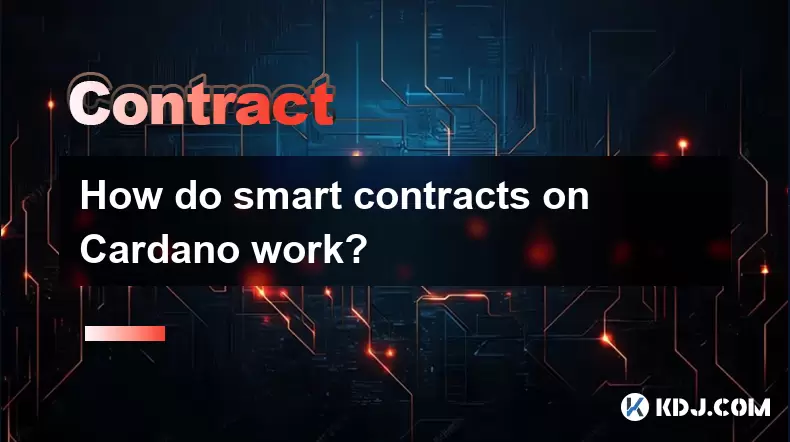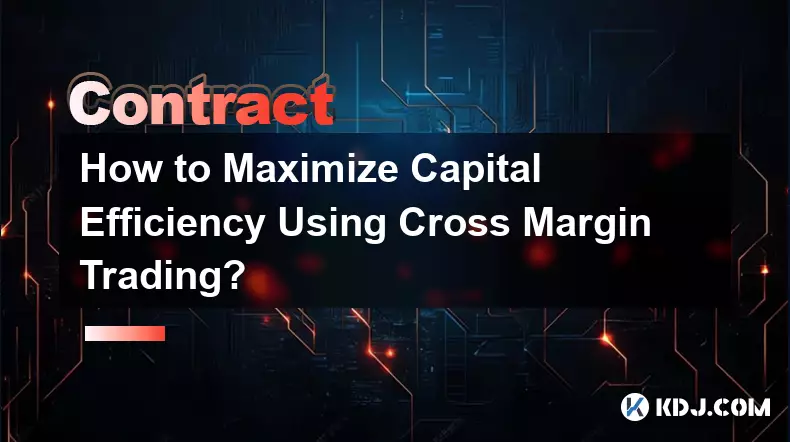-
 bitcoin
bitcoin $87959.907984 USD
1.34% -
 ethereum
ethereum $2920.497338 USD
3.04% -
 tether
tether $0.999775 USD
0.00% -
 xrp
xrp $2.237324 USD
8.12% -
 bnb
bnb $860.243768 USD
0.90% -
 solana
solana $138.089498 USD
5.43% -
 usd-coin
usd-coin $0.999807 USD
0.01% -
 tron
tron $0.272801 USD
-1.53% -
 dogecoin
dogecoin $0.150904 USD
2.96% -
 cardano
cardano $0.421635 USD
1.97% -
 hyperliquid
hyperliquid $32.152445 USD
2.23% -
 bitcoin-cash
bitcoin-cash $533.301069 USD
-1.94% -
 chainlink
chainlink $12.953417 USD
2.68% -
 unus-sed-leo
unus-sed-leo $9.535951 USD
0.73% -
 zcash
zcash $521.483386 USD
-2.87%
How do smart contracts on Cardano work?
Cardano's smart contracts, powered by Plutus and Marlowe, offer secure, scalable, and accessible decentralized application development through functional programming and financial DSLs.
Jul 12, 2025 at 10:56 am

Understanding Smart Contracts on Cardano
Smart contracts are self-executing agreements with the terms directly written into code. On Cardano, a third-generation blockchain platform, smart contracts operate differently compared to Ethereum due to its unique architecture and approach to scalability and security. Cardano's implementation of smart contracts is based on a layered structure that separates the ledger of account values from the computational layer where smart contracts reside.
The computational layer, known as the Cardano Smart Contracts Layer (CSL), allows developers to deploy and execute decentralized applications (dApps) using Plutus, a purpose-built smart contract language based on Haskell.
Plutus plays a central role in enabling smart contracts on Cardano by providing a robust and secure environment for writing, testing, and deploying logic-based transactions.How Plutus Powers Cardano Smart Contracts
Plutus is the primary language used for developing smart contracts on Cardano. It combines both on-chain and off-chain components, ensuring high levels of correctness and safety. Developers write smart contracts in Plutus using functional programming paradigms, which are then compiled into Plutus Core—a low-level language understood by the Cardano Virtual Machine (CVM).
Unlike Ethereum’s Solidity, which uses an imperative model, Plutus is purely functional, reducing the chances of side effects and unexpected behaviors during execution. This design choice significantly enhances the auditability and verification capabilities of smart contracts.
- The on-chain part of a Plutus contract is responsible for validating transactions according to predefined conditions.
- The off-chain part handles computations that occur outside the blockchain, such as user interactions or data fetching before a transaction is submitted.
The Role of Marlowe in Cardano Smart Contracts
For users who are not proficient in programming, Marlowe offers a domain-specific language (DSL) tailored for financial smart contracts. It allows non-developers to create complex financial instruments like escrow agreements, options, and auctions without writing traditional code.
Marlowe abstracts away much of the complexity involved in building smart contracts. It provides a visual interface and step-by-step builder, making it accessible to business professionals and finance experts.
- Marlowe contracts are interpreted by the Plutus framework.
- They can be tested in a sandbox environment before deployment.
- Each contract follows a finite-state machine model, ensuring predictable behavior.
Transaction Validation and UTXO Model
Cardano utilizes the UTXO (Unspent Transaction Output) model, similar to Bitcoin, rather than Ethereum’s account-based model. In this system, each transaction consumes existing UTXOs and creates new ones, enhancing privacy and parallel processing capabilities.
When a smart contract is executed, it validates whether the provided inputs meet the required conditions defined in the script. If they do, the transaction is accepted; otherwise, it is rejected.
- Smart contracts are attached to UTXOs as scripts.
- These scripts define under what conditions the UTXO can be spent.
- Every validator script must return a boolean value—True or False.
Developing and Deploying Smart Contracts on Cardano
To develop a smart contract on Cardano, you need to set up the appropriate toolchain, including the Plutus Playground, Haskell development tools, and the Cardano CLI. Here’s how to get started:
- Install the Plutus Development Environment, which includes the Plutus Playground and supporting libraries.
- Write your contract using the Plutus language in a Haskell IDE like VS Code or IntelliJ.
- Use the Plutus Playground Simulator to test your contract logic before deployment.
- Compile the contract into Plutus Core using the built-in compiler.
- Submit the contract via the Cardano CLI or a wallet integration like Nami Wallet or Lace.
Deployment involves attaching the compiled script to a UTXO and specifying the execution parameters, such as fees and time constraints.
Each step must be followed precisely to ensure compatibility with the Cardano node software and avoid runtime errors during contract execution.Frequently Asked Questions (FAQ)
Q: Can I use Solidity to write smart contracts on Cardano?A: No, Cardano does not support Solidity. It uses Plutus and Marlowe as its native smart contract languages.
Q: Are Cardano smart contracts Turing complete?A: Cardano’s Plutus scripts are not fully Turing complete to prevent infinite loops and resource exhaustion. Instead, they are designed to be Turing incomplete but expressive enough for most decentralized applications.
Q: How are transaction fees calculated for smart contracts on Cardano?A: Fees depend on the size of the transaction and the computational resources consumed. Complex contracts generally incur higher fees due to increased script execution demands.
Q: Is there a way to upgrade deployed smart contracts on Cardano?A: Yes, developers can implement upgradeable contracts by designing them with proxy patterns or versioned scripts that allow future modifications while maintaining immutability guarantees.
Disclaimer:info@kdj.com
The information provided is not trading advice. kdj.com does not assume any responsibility for any investments made based on the information provided in this article. Cryptocurrencies are highly volatile and it is highly recommended that you invest with caution after thorough research!
If you believe that the content used on this website infringes your copyright, please contact us immediately (info@kdj.com) and we will delete it promptly.
- Bitcoin Faces Liquidity Test Amid Shifting Institutional Support Landscape
- 2026-02-05 13:05:01
- Volkswagen Tayron R-Line 7-Seater: A New Era of Luxury Family SUV Hits India
- 2026-02-05 13:00:01
- AI, Crypto Bounties, and Human Labor: The Shifting Landscape of Work
- 2026-02-05 13:00:01
- Volkswagen Unleashes the Tayron R-Line: Pre-Bookings Now Live for Flagship Seven-Seater SUV
- 2026-02-05 12:55:01
- Bitcoin Drops Amidst Analyst Warnings and Shifting Market Sentiment
- 2026-02-05 09:40:02
- The Great Stablecoin Showdown: Systemic Risk, the GENIUS Act, and the Battle for Wall Street's Future
- 2026-02-05 12:55:01
Related knowledge

How to Manage Emotions and "Revenge Trading" in Futures?
Feb 05,2026 at 12:19am
Understanding Emotional Triggers in Futures Markets1. Market volatility directly impacts psychological states, often amplifying fear or euphoria based...

How to Analyze Market Sentiment Using the Fear and Greed Index?
Feb 05,2026 at 07:40am
Understanding the Fear and Greed Index1. The Fear and Greed Index is a composite metric designed to quantify prevailing emotional states among cryptoc...

How to Use Volume Profile to Find Key Futures Entry Levels?
Feb 04,2026 at 11:39pm
Understanding Volume Profile Structure1. Volume Profile displays the distribution of traded volume at specific price levels over a defined time period...

How to Trade Bitcoin Futures with 100x Leverage? (High-Risk Setup)
Feb 05,2026 at 11:00am
Understanding Bitcoin Futures Mechanics1. Bitcoin futures contracts represent agreements to buy or sell BTC at a predetermined price and date in the f...

How to Maximize Capital Efficiency Using Cross Margin Trading?
Feb 05,2026 at 12:40am
Cross Margin Trading Fundamentals1. Cross margin trading allows traders to use their entire account balance as collateral for open positions across mu...

How to Trade Crypto Contracts During Major News Events? (CPI/FOMC)
Feb 05,2026 at 09:59am
Understanding Market Sensitivity to Macro Data Releases1. Cryptocurrency futures markets exhibit pronounced volatility during U.S. CPI and FOMC announ...

How to Manage Emotions and "Revenge Trading" in Futures?
Feb 05,2026 at 12:19am
Understanding Emotional Triggers in Futures Markets1. Market volatility directly impacts psychological states, often amplifying fear or euphoria based...

How to Analyze Market Sentiment Using the Fear and Greed Index?
Feb 05,2026 at 07:40am
Understanding the Fear and Greed Index1. The Fear and Greed Index is a composite metric designed to quantify prevailing emotional states among cryptoc...

How to Use Volume Profile to Find Key Futures Entry Levels?
Feb 04,2026 at 11:39pm
Understanding Volume Profile Structure1. Volume Profile displays the distribution of traded volume at specific price levels over a defined time period...

How to Trade Bitcoin Futures with 100x Leverage? (High-Risk Setup)
Feb 05,2026 at 11:00am
Understanding Bitcoin Futures Mechanics1. Bitcoin futures contracts represent agreements to buy or sell BTC at a predetermined price and date in the f...

How to Maximize Capital Efficiency Using Cross Margin Trading?
Feb 05,2026 at 12:40am
Cross Margin Trading Fundamentals1. Cross margin trading allows traders to use their entire account balance as collateral for open positions across mu...

How to Trade Crypto Contracts During Major News Events? (CPI/FOMC)
Feb 05,2026 at 09:59am
Understanding Market Sensitivity to Macro Data Releases1. Cryptocurrency futures markets exhibit pronounced volatility during U.S. CPI and FOMC announ...
See all articles























![KING vs PAINIFY😳 (1v1 ZONEWARS) [FORTNITE TOKEN/WAGER] KING vs PAINIFY😳 (1v1 ZONEWARS) [FORTNITE TOKEN/WAGER]](/uploads/2026/02/05/cryptocurrencies-news/videos/origin_6984035326d58_image_500_375.webp)
![2/4 [U.S. Hot Search] CIA: Xi Jinping is a paranoid | Xi Jinping’s two phone calls | Shandong’s “Internet-addicted” teenagers rebelled against tyranny | A direct attack on the Chengdu hacker national team | Why GDP must grow by 5% | The bridge under construction by the China Railway 12th Bureau collapsed | Thousands of billions of dollars spent abroad and thirty billion domestic subsidies | 2/4 [U.S. Hot Search] CIA: Xi Jinping is a paranoid | Xi Jinping’s two phone calls | Shandong’s “Internet-addicted” teenagers rebelled against tyranny | A direct attack on the Chengdu hacker national team | Why GDP must grow by 5% | The bridge under construction by the China Railway 12th Bureau collapsed | Thousands of billions of dollars spent abroad and thirty billion domestic subsidies |](/uploads/2026/02/05/cryptocurrencies-news/videos/origin_69840a757417b_image_500_375.webp)

















































